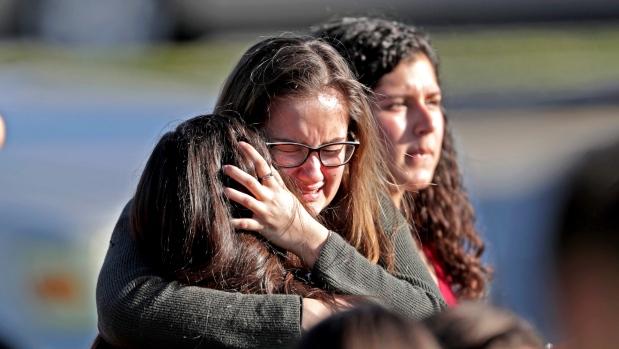Washington — When the going gets tough for President Trump, as it has virtually from the moment he took office, he has a ready and remarkably restorative message to convey: You are in danger, and I will do what it takes to protect you.
The danger he points to more than any other is terrorism.
So, after a rocky first month left him with the lowest approval rating for any new president in history, Mr. Trump returned to familiar rhetorical ground on Tuesday night in his otherwise uncharacteristically positive speech to a joint session of Congress.
“We have seen the attacks in France, in Belgium, in Germany and all over the world,” he said. “We cannot allow a beachhead of terrorism to form inside America, and we cannot allow our nation to become a sanctuary for extremists.”
Historians will long ponder the factors behind Mr. Trump’s unlikely rise to the presidency. Most analyses cite his advocacy for the economically disaffected, his rejection or embrace of one form of identity politics or another, or his preternatural ability to connect with “Middle America.”
But another factor deserves attention: a bipartisan approach to national security focused on terrorism that has distorted America’s understanding of its interests.
The global terrorist threat requires a serious response. But since the attacks of Sept. 11, 2001, sober analysis has too often fallen victim to political expediency, and fear has become divorced from facts, with profound — and largely unexamined — impact on our domestic politics.
More than any of his rivals, Mr. Trump successfully exploited America’s obsession with terrorism. As a candidate with no national security credentials, he relentlessly trumpeted the threat — for example calling, just before primaries began, for “a total and complete shut down of Muslims entering the United States until our country’s representatives can figure out what the hell is going on.” General election exit polls showed 18 percent of voters considered terrorism to be the most important issue; nearly 60 percent of them supported Mr. Trump.
In the years after 2001, an average of fewer than nine Americans per year have been killed in terror attacks on American soil, compared, for example, with an average of about 12,000 a year who are shot to death in non-terror related incidents.
President Barack Obama was ridiculed for noting (correctly) that more Americans die each year falling in the bathtub than from terrorism. The fact that Americans are 1,333 times more likely to be shot dead by a criminal than killed by a terrorist has not persuaded Congress to take the former nearly as seriously as the latter. And while every lethal “jihadist” attack in the United States since 9/11 has been conducted by a citizen or permanent resident, elected officials continue to stress the threat posed by those who come from abroad.
True, statistics alone cannot convey terrorism’s unique resonance. It combines the wrong-place-wrong-time randomness of a natural disaster with the precision of a hate crime. It can reach influential, and otherwise seemingly invulnerable, communities, like marathon runners in Boston, or bankers in Lower Manhattan. Meanwhile, bathtub manufacturers do not spend their days plotting more effective death traps. And it will always be easier to incite fear of foreigners than of our neighbors.
Whatever the explanation, our intense focus on terrorism has helped spawn a veritable counterterrorism industrial complex, made up of new government agencies, private firms and an army of well-funded experts, who keep the issue atop the national agenda.
As a result, without much empirical rationale, concern about terrorism is rising: Today, 80 percent of Americans reportedly consider terrorism a “critical threat,” compared with less than 60 percent citing North Korea, which may soon be able to strike the United States territory with a nuclear missile.
Little surprise, then, that both major parties compete in rhetorical one-upmanship to demonstrate toughness on terrorism and govern accordingly. We watched this dynamic play out over several years serving in senior national security positions at the White House and State Department, in an administration that came to office concerned about the overemphasis on terrorism.
For example, on Syria, those who favored increasing support to groups fighting President Bashar al-Assad argued he was a magnet for terrorists who would flock to Syria so long as he remained in power. Those dubious of such support pointed to troubling ties between those same opposition groups and Al Qaeda. On Iraq, those reluctant to condition American support for Iraq’s Shiite-dominated government on its willingness to wield power more inclusively cited the imperative to support its fight against the Islamic State. Others argued its governance style drove Iraqi Sunnis into the jihadists’ arms.
Reasonable minds can debate the result of these decisions. But arguments on all sides often became substitutes for more vexing discussions of America’s role in the world, its responsibility (or not) to intervene, and the importance (or not) of defending human rights. Claiming to have found the better way to fight terrorism became the surest way to win the debate.
This emphasis on terrorism has important effects beyond the Situation Room. It diverts limited time and resources from issues like China’s rise or Russian aggression. It can lead to overreliance on military action and false measures of success like body counts. It can stifle conversation, since decisions justified by threats to the homeland are insulated from criticism. And as the counterterrorism rationales from internal arguments find their way into speeches and official statements, it ratchets up public anxiety.
Which brings us back to President Trump.
While it is far from the only explanation, organizing foreign policy around international terrorism has resuscitated strains of American political thought — isolationism, xenophobia and even bigotry, particularly against Muslims — that had long been dormant, or at least disreputable, giving national security cover and lifting them from the shadows to the mainstream.
In a climate of unfounded fear, extreme policies like barring travel to the United States from certain Muslim-majority countries, which seem more about engineering a particular American identity than about stopping attacks, become the logical extension of an illogical threat assessment that Mr. Trump may champion, but that is not of his making.
Diagnosing this problem is far easier than fixing it. Terrorism has inflicted disastrous consequences, and counterterrorism — including military strikes — remains an essential tool. The question is whether some balance can be restored.
President Obama rolled back many excesses of George W. Bush’s administration. He championed a global effort to address terrorism’s social and economic drivers, codified more restrictive guidelines for operations, required greater transparency on civilian casualties, and rejected alarmist notions of an “existential” threat or a “global war.”
But, cheered on by Republicans who backed him on little else, he also authorized counterterrorism missions in several new theaters, ramped up military strikes, and made the killing of Osama bin Laden a campaign slogan and the fight against the Islamic State the most visible initiative of his late second term.
Having recruited advisers obsessed with the specter of “radical Islam” and asked the Pentagon for a more aggressive strategy, Mr. Trump seems poised to expand where Mr. Obama leaned in, while dispensing with the restraints the last president imposed.
The American people deserve a cleareyed analysis of terrorism, and our responses to it, and the sooner the better. As it did with the creation of the Iraq Study Group 10 years ago, Congress could convene a bipartisan panel to dispassionately assess the terrorist threat and how our government is positioned to meet it.
More likely, with neither the president nor his opponents inclined to de-escalate the rhetorical arms race, this issue will loom even larger in elections to come, with conditions ripe for overreaction to a future attack on American soil. That’s understandable, but unfortunate. A more honest national conversation about terrorism would be better for our security, and healthier for our politics.










